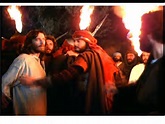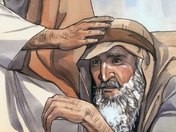Psalm 3 (Part 3 of 3) (series: Lessons on Psalms)
by John Lowe
(Woodruff, S.C.)

Strike all my enemies on the jaw.
“Arise, O Lord . . . For You have struck all my enemies”: David’s mind was both on what he trusted God to do (Save me, O my God) and on what God had done (struck all my enemies . . . broken the teeth of the ungodly). Knowing what God had done in the past gives David confidence in what the LORD would do.
David had many good old soldiers about him, such as the Cherethites, Pelethites, Gittites, and others that would stick with him—“All his men marched past him, along with all the Kerethites and Pelethites; and all the six hundred Gittites who had accompanied him from Gath marched before the king” (2 Samuel 15:18). These were mighty men of war, and they were angry and itching for a fight. David himself was a great man of war from his youth. The Lord promised to make him great and gave him the victory over his enemies—“Now then, tell my servant David, 'This is what the LORD Almighty says: I took you from the pasture and from following the flock to be ruler over my people Israel” (2 Samuel 17:8). He was not used to being vanquished; yet he flees to God for deliverance, and pleads for Him to remember the covenant—“Save me, for I am yours . . .” (Psalms 119:94).
Break the teeth of the wicked.
“Break the teeth of the wicked” is a vivid metaphor which is also used in Psalm 58:6: “Break the teeth in their mouths, O God; tear out, O LORD, the fangs of the lions!” It speaks of the total domination and defeat of the enemy. David looked for protection in this Psalm, but more than protection—he looked for victory. It wasn’t enough for David to survive the threat to the kingdom. He had to be victorious over the threat, and he would be, with the blessing of God.
“The teeth”, is a reference to the enemy’s strength and the instruments of their cruelty. Thou hast broken the teeth of the ungodly is evidence that David is thinking about the Lord’s deliverance from danger he faced in the past. “Help me now as You did then; do not leave me now; but deliver me from this army that surrounds me, just as You delivered me from other powerful enemies when I called on you in the past. Though he is currently in a situation where escape is humanly impossible, he is able to encourage himself by recollecting his former experiences, where God intervened on his behalf and graciously saved him from his cruel enemies, who had frequently attempted the destruction of his person and kingdom. He compares those enemies to savage beasts, which tear their prey with their teeth, and grind them up with their jaws, an image which, in a country abounding with ravenous creatures, was familiar to all and very expressive.
The use of “jaw” and “teeth” represents his enemies as fierce, like wild beasts ready to devour “When evil men advance against me to devour my flesh, when my enemies and my foes attack me, they will stumble and fall” (Psalm 27:2), and smiting their cheekbone “Then Zedekiah son of Kenaanah went up and slapped Micaiah in the face. "Which way did the spirit from the LORD go when he went from me to speak to you?" he asked” (1 Kings 22:24) denotes violence and insult. Breaking the teeth of the enemy would deprive them of the power to injure.
Some, however, understand this psalm differently from how it is related here. They believe that the former verses provide David’s state of mind during his flight from Absalom, and that he is expressing his thankfulness for his deliverance, which he ascribes entirely to God’s power and goodness.
8 From the LORD comes deliverance. May your blessing be on your people. "Selah"
From the LORD comes deliverance.
David understood that salvation, both in the ultimate and immediate sense, was God’s property. It isn’t the property of any one nation or sect, but of the LORD God. In order to be saved, one must deal with the LORD Himself.
David placed his confidence in the Lord, and he could say, “I don’t expect to be saved by my forces or the advice of my wise counselors, but by your aid, power, and favor alone.”
His confidence came from personal experience, for God had often broken the power of his enemies and restrained their wickedness, he had smitten them upon the cheek-bone (v. 7), silenced them and stopped their speaking, defeated them and put them to shame, disabling them by breaking their teeth, so that they were no longer a threat. Saul and the Philistines, who were sometimes ready to swallow him up, could not accomplish what they sought to do. The teeth that are clenched, sharpened and bared against God's people shall be broken. When, at any time, the power of the church's enemies seems threatening, it is good to remember how often God has broken their teeth, and that their arms are too short to box with God. He can stop their mouths and tie their hands.
May your blessing be on your people.
This showed David’s heart in a time of personal calamity. He wasn’t only concerned that God’s hand would be upon himself, but upon all God’s people. He didn’t pray for preservation and victory over Absalom just for his own sake, but because it was best for the nation. He appealed to God for “Thy blessing—that it be upon thy people — Either upon my friends and followers, who alone are thy people, the rest being rebels and your enemies as well as mine; or upon all thy people Israel, to preserve my friends, to convince and convert my enemies, and to save the body of the nation, which, without thy mercy, are likely, by this civil war, to be brought to utter ruin.”
David prays for his rebels, as Christ and Stephen afterward would pray for their persecutors and murderers, but he prayed especially for those who remained loyal to him, and would shortly fight for him. David knew that victory is of the Lord, and must be got by prayer. The people understood this, and therefore persuaded David not to take the field with them, but to stay at home and pray for them—“But the men said, "You must not go out; if we are forced to flee, they won't care about us. Even if half of us die, they won't care; but you are worth ten thousand of us. It would be better now for you to give us support from the city” (2 Samuel 18:3). It is better, they say, that you stay in the city; your prayers will prevail with God for our assistance.
What a blessed joyful conclusion! What could open more gloomy and discouraging than this Psalm did! What can end more triumphant and joyful! But do not fail to trace the turnaround to its source: Salvation is of God.
No content on preachology.com may be printed or
copied to any other site without permission.
|
The Preaching Ezine Subscribe to my free newsletter for monthly sermons and get a free book right now. Just follow the link above and get the details! |
|
Sermon Supply Ministry
Be ready for Sunday…before Saturday night! |
|
Manna Seminary
Did you ever want to start or finish your Ministry Training? |
|
YOUR PAGES: by sharing YOUR great sermons! by sharing YOUR great poems! |










